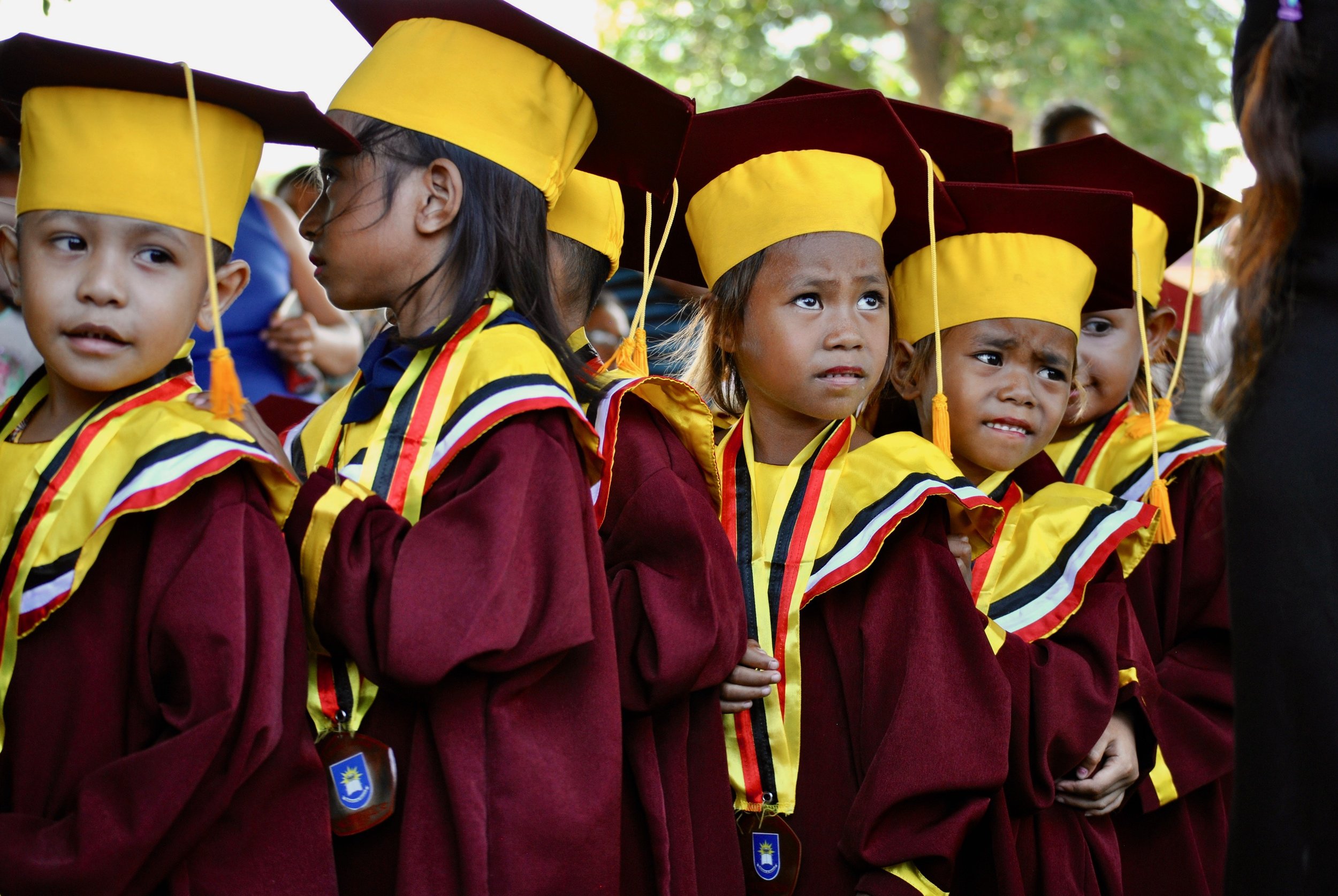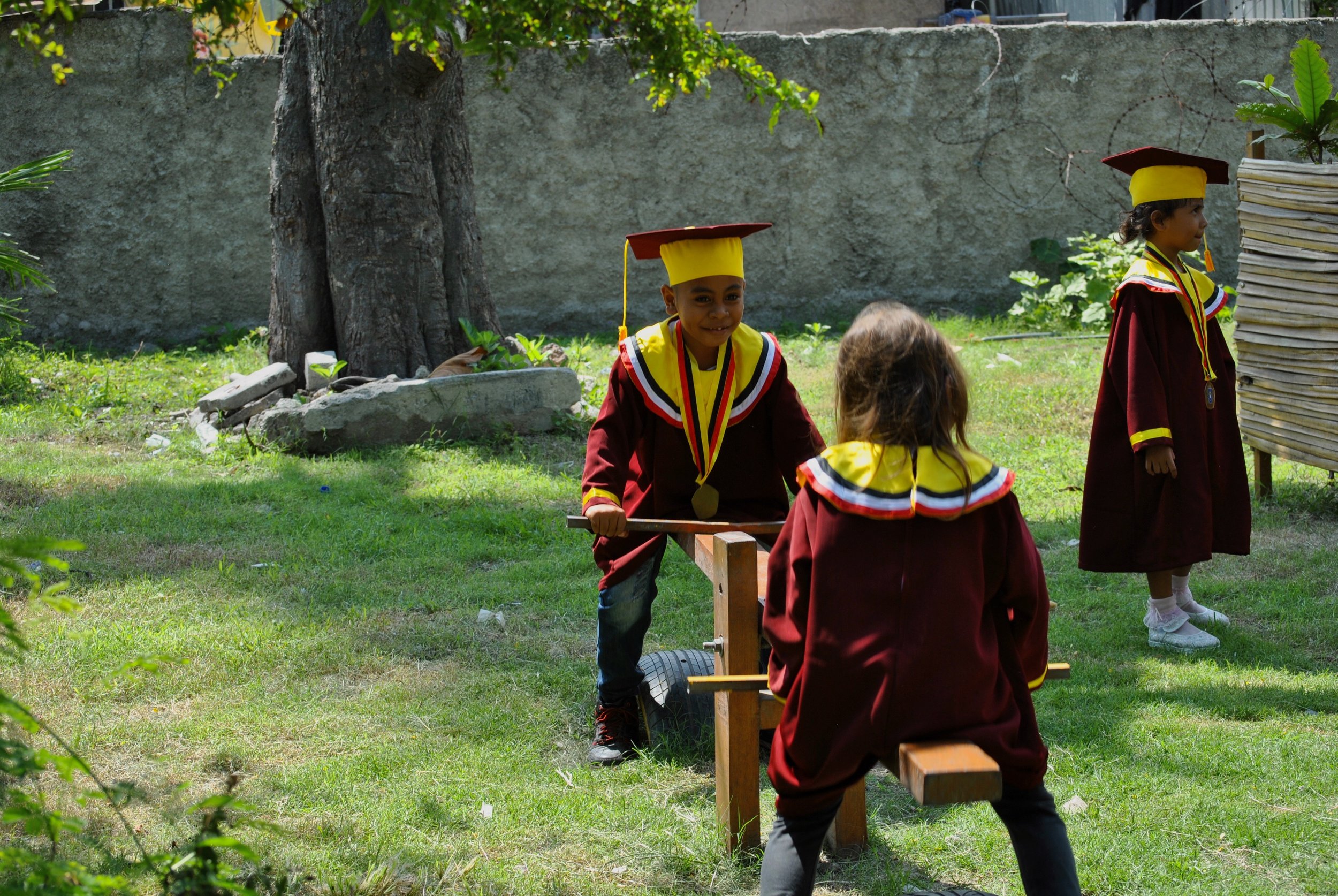HANDS: Fostering early childhood education in Timor-Leste
How to move forward? For a young country like the Democratic Republic of Timor-Leste, so young in fact that it was the first sovereign state of the twenty first century, one way to answer that question is with the future and opportunities created for its children. Since 2011, preschool education has become a priority for the Government of Timor-Leste and, with the support of the New Zealand government, a reality.
Timor-Leste declared independence from Portugal in 1975. Nine days later they were invaded by Indonesia, who occupied the country until 2001. The effects and challenges of this period are still being felt, as the country seeks to find its feet and create a future shaped in their own vision. A great deal of educational, economic and social development is needed in its communities, and with 60% of the population under 25 the focus for many is firmly on the youth and children of Timor-Leste; a key part of which is creating and supporting preschool education.
Beginning in 2014, the Ministry of Education, Ministry of State Administration and preschooling specialists worked together with the New Zealand embassy to create a programme for preschool development in Timor-Leste. Called HANDS, the name is an acronym of Halimar, Aprende, no Deskobre, Susesu - Tetun words (the national language of Timor-Leste) that translate to Play, Learn, and Discover, Succeed. These sentiments underpin the goals and initiatives of the programme, capturing the areas of support from the New Zealand government. The HANDS programme is planned to run until 2019.
Children graduating from Caridade Public Preschool
Ambassador to Timor-Leste, Vicki Poole, explains its importance and impact. "New Zealand's investment in early childhood education has been greatly appreciated by the Government of Timor-Leste. The aim is to help the Ministry of Education to improve the way it manages early childhood education. In the first two years of HANDS implementation we have supported 338 preschools with 20,000 children through learning materials and providing training to teachers. New Zealand is also working with UNICEF to design a new initiative to provide early childhood education in the most rural parts of the country."
There are now around 356 preschools (public, private and Catholic) in Timor-Leste, and 47 of those are in its capital city Dili. I was lucky to witness the effects of this programme first hand, attending a graduation ceremony at Public Preschool Caridade in Dili, where they not only celebrated the students’ achievements but also unveiled a groundbreaking new playground design, facilitated by the HANDS programme.
Girl leads other children in song
An organised structure for preschooling in Timor-Leste didn’t begin until 2011, when Abelina da Costa was made the Director of Preschools for the Ministry of Education. She has been involved in preschool education since 2008, and had studied Early Childhood Education, including a stint period at Victoria University in Wellington funded through MFAT. “After post-conflict in 1999 we started to organize preschools, but we followed the Indonesian system, so UNICEF and some NGOs supported us to organize the preschools education for the kids, but not formally. We had no Directorate yet and we just had one section in the Education Ministry… In 2011 we were given a Directorate and structure, and preschooling became a first priority for the national [education] plan.”
Since 2011, there has been a steady realisation amongst the communities of Timor-Leste about the benefits a preschool education can provide to both children and their families. Abelina da Costa stresses the importance of preschool education for supporting further education and raising the retention rate in schools. “Children that start [their education] in the preschools learn how to learn. They become comfortable to go [on] to basic education… Not so many repeat or drop out, because they pass their classes.” It’s been shown the children who attend preschools leave much better prepared for further education, and fare better in primary school thanks to the skills they have developed.
Abelina (far right) and community leaders at Caridade Public Preschool
The positive effects of early childhood education in Timor-Leste can be felt throughout the community. Schools like Public Preschool Caridade not only encourage parents to help teachers during classes, they also provide parenting education, where people are taught both how to care for their children, and how to support their learning.
The support provided by the New Zealand government is tangible, including the procurement and distribution of learning materials and furniture to 320 preschools, teacher training and resources, and the local design and construction of 150 preschool playgrounds. The first prototype playground was unveiled to the delight of the children at Caridade Public Preschool.
The playground at Caridade Public Preschool
These playgrounds are not only one of the most visible aspects of the HANDS programme, but also incredibly important: the incorporation of play-based learning is fundamental to children’s social and cognitive development. Abelina explains their importance, “kids in preschool learn through play and discover knowledge. That’s why the playground is very important to support and help the kids - helping them develop physically, cognitively and also [learn] how to play together - sharing together and also learning together with their friends.” Children who are able to explore play and imagination in their first six years have been shown to have improved achievement as adults in everything from education to income generation - both vital to a developing country like Timor-Leste.
The goal of the HANDS programme is to work together with the Ministry of Education and the Timor-Leste Government’s PNDS Programme (National Village Development Programme) to construct 150 playgrounds, funded by the New Zealand Government. The playground at the Caridade Public Preschool was the fourth of these to be created.
The playground at Caridade Public Preschool
The HANDS programme technical advisors worked closely with Caridade’s teachers and parents to construct the playground, utilising the skills of local builders and the community, and ensuring materials were sustainable and locally sourced (excluding the plastic slide). One of the predominant features of this design is its two story cubby house, inspired by traditional Timorese buildings and made from materials that include palm frond wood (bebuk) and coconut tree fibre.
Using local materials is not only cheaper and more sustainable, it means the playground has familiarity to the local community and is easier to maintain. And above all, as Abelina explains, it creates a sense of pride. “It represents not only hope for the community but the opportunity [for the community] to contribute towards the maintenance and care for these playgrounds, how to clean up, and together with the teachers how to care for their environment to be safe for the children to play in.”
The playground at Caridade Public Preschool
A Ministry standard design for preschool playgrounds has been approved and will now be used to construct another 150 playgrounds starting 2018. Preschools must apply to PNDS for a playground, and once approved, the New Zealand Government will provide a grant to fund the full cost of materials, labour and supervision by the PNDS village committee. It’s important that playgrounds, like all new infrastructure, need to be designed and suited to local conditions to remain functioning for longer. Each new playground will utilise local labour. This not only creates much needed employment, but ensures skills are fostered and remain in that community for ongoing maintenance.
Alongside the rollout of these playgrounds, the next steps for preschool education in Timor-Leste involve the development and roll out of a tertiary qualification in early childhood teaching, the professional development, materials and transportation for preschool inspectors to ensure quality and compliance, and support for the Ministry of Education to provide accreditation, licensing and legal framework to manage preschools.
What I witnessed at the Caridade Public Preschool was a sense of community, pride and hope in the empowerment and future education can provide, and how impactful it can be when a community gathers behind it. Their impact extends far beyond the children themselves, providing growth and sustainability for the community at large, and vital skills for the future. For Abelina, preschools and the power of play are everything. “It’s the foundation of education. I love my job.”
Girl diligently cleaning her shoes






